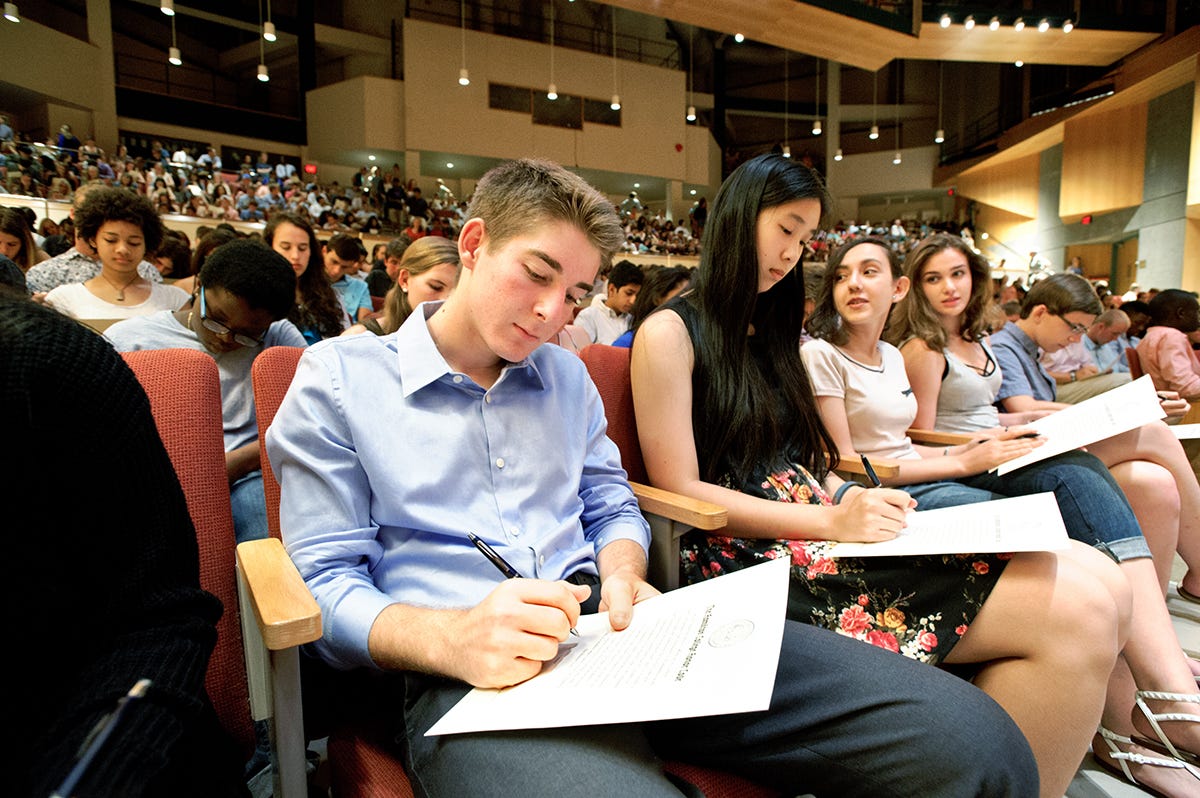
At the end of the four-day Outreach Adventure (OA), Exploration Adventure (XA), or Adirondack Adventure (AA) orientation trips, all first-years and transfer students return to campus slightly disheveled and fairly sleep-deprived; nevertheless, they arrive with new friends and distinct memories (which may or may not involve Jell-o No-Bake), eager to jump in the shower and spend the first night back in their cozy, twin-XL bed.
The next three days on College Hill Road are filled with on-campus orientation events guided to help new students acclimate to the academic rigor of Hamilton College. The week-long orientation concludes with President Wippman officially ringing in the new academic year during Convocation in Wellin Hall. Convocation is, arguably, the most important event of orientation. Why, you ask? Because it is when, facing the stage on which Hamilton’s faculty and administration are seated, students sign the Honor Code pledge.
The Hamilton College Honor Code epitomizes the spirit of our tight-knit, welcoming community built upon a foundation of trust, honor, and respect for each and every member of our college. The Honor Code reads as follows:
“By my signature below, I affirm on my honor that I will abstain from dishonesty in all academic work. I have read and understand the Honor Code and I will abide by its provisions. I will work to strengthen the honor of Hamilton College and its students by upholding the Honor Code myself and working to ensure others do as well.”
The Honor Code is one of the many things that distinguishes Hamilton from other colleges and universities, allowing the College to thrive and flourish on integrity and candor. In recognition of the importance of the Honor Code, Hamilton mandates that all students sign the pledge before registering for classes.
In situations when the Honor Code has allegedly been violated, cases are addressed by the Honor Court. The Honor Court is comprised of a student chair, seven students, and three faculty members. Its purpose is to “uphold Hamilton community standards of academic honesty and to ensure protection of students’ rights in questions of alleged violations of the Hamilton College Honor Code.”
The initial meeting involves the Dean of Students, Chair of the Honor Court, the witness of the suspected violation, and the respondent suspected of violating the Honor Code. For most cases, the issue is resolved within this first meeting. If, however, the respondent believes that he/she did not violate the Honor Code and wishes to proceed to a full Honor Court hearing, he or she has the option to do so.
The Spectator
sat down with Evan Weinstein ’19, the current chair of the Honor Court, to discuss his thoughts on Hamilton’s Honor Code. Weinstein has been on the Honor Court throughout his four years at Hamilton, serving as a class representative during his freshman and sophomore year and as Chair of the Honor Court during his junior spring and senior fall.
With a student body of just 1,850 students and a student-faculty ratio of 9:1, Hamilton stresses the significance of building and maintaining relationships. “The Honor Code is one of the things that distinguishes college from high school,” said Weinstein. “When students arrive at Hamilton, professors treat the students as their peers. The Honor Code is what allows them to take students more seriously and treat them as colleagues, rather than as students. They treat students as individuals they can fully trust, and the Honor Code ensures that this trust is possible. It codifies that trust into a written document.” In other words, the Honor Code enables the establishment of trust between professors and students.
Since Hamilton’s community revolves around trust, situations in which this trust has been violated are not taken lightly. The list of sanctions for violations of the Honor Code ranges from an initial warning, which includes a mandatory completion of an academic integrity tutorial, to expulsion. “[My job as Chair of the Honor Court] has been hard in the sense that I’ve had to tell people that they’re failing a course or that they’re being expelled from the school,” Weinstein says. “My job is rewarding in the sense that, as a result of having to tell people the consequences of, arguably, the worst part of their academic career, I’ve become more empathetic, understanding, and forgiving.”
Weinstein is not the only person who focuses on the positive after these difficult situations. Students learn from their experience and generally do not commit second violations; recognizing that writing and communication are at the core of Hamilton’s values, students find gratification in sharing their original thoughts and ideas.
Hamilton has fostered an environment which underscores the importance of community, academic integrity, and diversity of intellectual thought. The Honor Code represents a pillar of trust, establishes a significant message for the student body, and builds confidence and character by emphasizing that students should take pride in calling their work their own.
More information regarding the Honor Code procedures and sanctions can be found on Hamilton’s website.

















